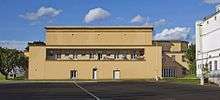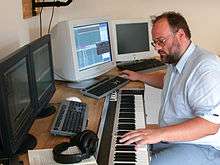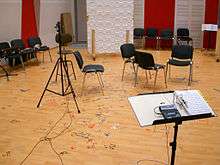Vienna Symphonic Library
Vienna Symphonic Library GmbH (VSL) is one of the leading developers[1] of sample libraries and music production software for classical orchestral music. The company is located in a landmark protected building, called Synchron Stage Vienna based in the Austrian capital's 23rd district.


The Vienna Symphonic Library provides virtual instruments and the digital recreation of the acoustics of famous concert halls such as the Konzerthaus and the Große Sendesaal at Austrian Public Radio ORF's broadcasting house, both in Vienna, and the Sage Gateshead concert hall in England. The technique used is impulse response resulting in an authentic digital convolution reverb. The virtual instruments are based on digital samples of solo voices and instruments as well as orchestral ensembles. The VSL software acts as an interface for the music composer to play the real instruments on a MIDI keyboard.
History

The company was founded in Vienna in October 2000 by Herbert Tucmandl.[2] In the 1990s, Tucmandl, a former cellist (as a substitute member with the Vienna Philharmonic, amongst others), later cameraman, director and composer used some of the available first-generation sample libraries for the creation of his own film scores. He was unsatisfied with the sonic results of those products, mainly because they sounded too static and lacked of natural variations of the real instruments. Tucmandl began to develop a concept for a more realistic sounding orchestral sample library. In his research he concluded that single note samples were not sufficient to create a convincing musical performance. He realized that note transitions (e.g., legato) and multiple note repetitions were also needed. Tucmandl tested his concept with his own cello and managed to convince an investor to fund the new enterprise.

As the first step, the company designed and built a custom recording facility, called “Silent Stage”, for recording orchestral samples. The studio is located in Ebreichsdorf, a village near Vienna. Over several years Tucmandl invited singers, musicians, ensembles, orchestras there. Many of the musicians whose playing is featured in the final VSL products are or were members of Viennese orchestras.
The first product was released in December 2002, including modules for strings, brass, woodwinds and classical percussion. In 2005 the company released their own sample player, the “Vienna Instruments” player, which during the music production on a PC (Digital Audio Workstation) runs in the plug-in formats AU, VST, AAX Native and RTAS under Mac OS X and Windows. The reverberation application was released under the brand name “Vienna MIR”.
In March 2016, the Vienna Symphonic Library business offices moved into the new recording facility at Synchron Stage Vienna.[3] VSL ushers in a new era in April 2017 with the release of “Synchron Percussion I” that was recorded at the newly revitalized scoring stage. 16 percussion instruments were captured with a phase-controlled multi-microphone set-up, making it the first sample library that provides several available microphone positions also for Auro-3D mixes.[4]
Current Products (excerpt)
- Software packages: Vienna Instruments, Vienna Ensemble, Vienna Suite, Vienna MIR.
- Instrument categories: string instruments, strings instruments for chamber music, harps, woodwinds, brass, saxophones, the pipe organ of the Vienna Konzerthaus, Bösendorfer Imperial Grand piano, percussion, choirs
- The solo instruments range from flutes to plucked strings.
See also
- Michael Cooper: A Digital Orchestra for Opera? Purists Take (and Play) Offense in The New York Times, June 11, 2014
- Jacob Hale Russell, John Jurgensen: Fugue for Man & Machine, Wall Street Journal, May 5, 2007
- A roundup of the company's history in the German Recording magazine, May 2012
References
- see Sound on Sound magazine, March, 2014
- Herbert Tucmandl in the IMDB
- "Synchron Stage Vienna". Vienna Symphonic Library. Retrieved 16 April 2017.
- "Vienna Symphonic Library releases Synchron Percussion I - Multi Audio Format Percussion Library". www.kvraudio.com. KVR Audio, Inc. Retrieved 2 May 2017.